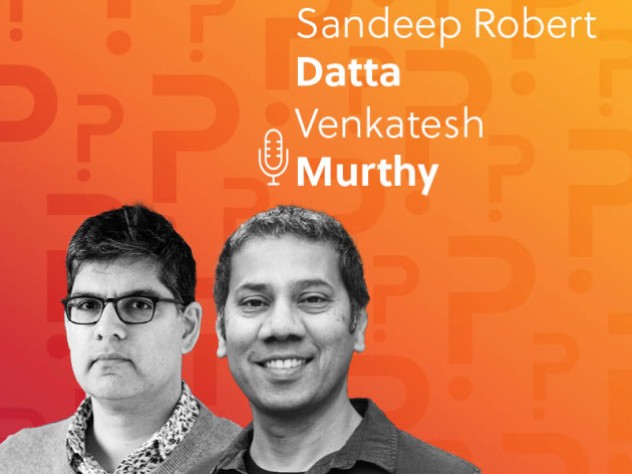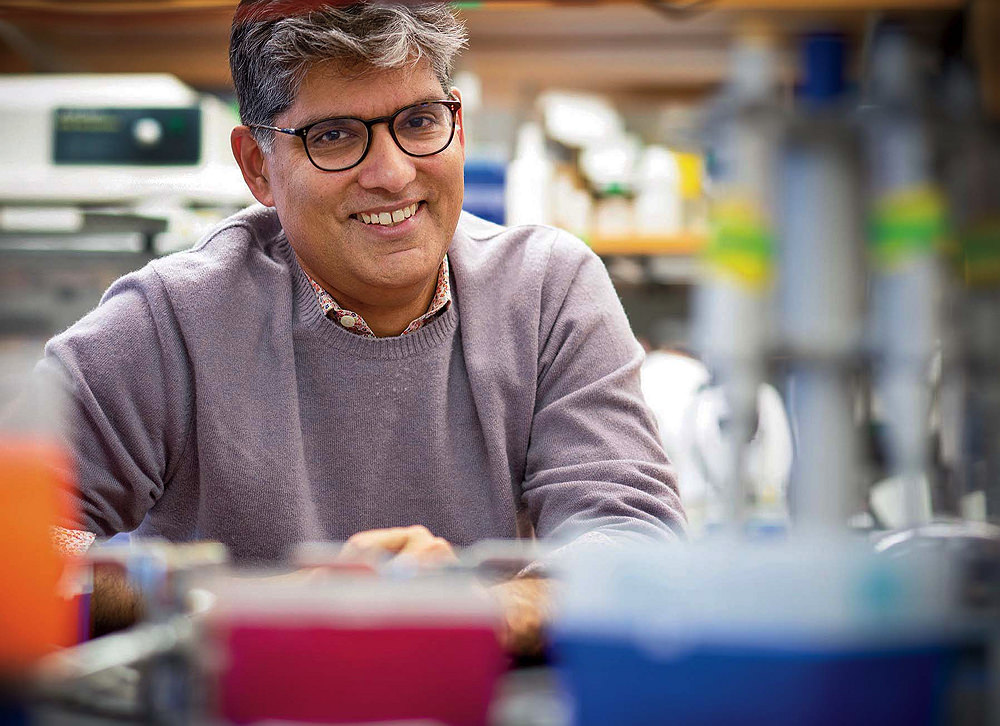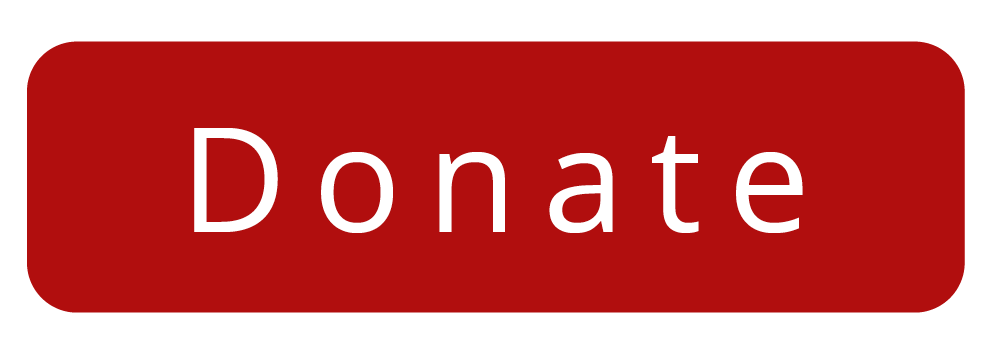Behind the Scenes: Ask a Harvard Professor Podcast
Associate editor Lydialyle Gibson reflects on her different interview styles for reporting in print versus broadcast and how podcasts can capture emotion in such a way that can be hard to translate into words.
When I sat down to interview neuroscientists Sandeep Robert Datta and Venkatesh Murthy for Harvard Magazine’s podcast this fall, I was nervous. As a writer, I’ve been asking scholars about their research for a decade and a half now, and I knew these two scholars already—I’d spent hours speaking with each of them for “The Mystery of Smell,” one of our November-December features.
But podcasting is still very much a skill-in-progress for me, and an interview for broadcast feels so different from talking to people for a print story. Interviewing for print, it’s not unusual to go down a few blind alleys that stray from the main focus—sometimes leading to nowhere, and other times to revelation. In these conversations, which (mercifully!) no other human ears will hear, there’s the freedom to ask truly dumb questions and sort out misapprehensions. You can clarify facts and ideas in sometimes plodding detail; and you can let people keep talking, allowing their stream-of-consciousness to spark your (or, often, their own) deeper questions and connections. I enjoy it when sources unspool long anecdotes or explanations, even knowing that these will likely appear only briefly, if at all, in the final story. Hearing everything helps me later when I’m trying to translate a person’s experience onto the page.
It is in these interviews that the central question for an article sometimes shifts. Initially, I’d gone into the feature wondering about how these scientists’ lives had changed with the pandemic. Last winter, as COVID cases rose sharply again and an urgent public curiosity about the inner workings of smell and smell loss took hold, I thought about how strange and intense it must be for researchers who’d spent decades toiling away in what was once an obscure corner of science to now suddenly become the center of attention. But after talking with Datta and Murthy, I realized that the more interesting and important question was the persistent and paradoxical mystery of smell itself. I remember the hairs standing up on my neck when Datta explained that not only do scientists not fully understand how the sense of smell works in the nose and the brain, but that they don’t even really know what smell itself is. This was not something I had imagined before. Any given odor, Datta told me—coffee, roses, rotten eggs—is not a single “thing,” but a collection of dozens or hundreds of separate chemicals, all at different concentrations, interacting with each other and with the olfactory system in ways that researchers don’t yet comprehend and can’t replicate. For me, this put the scale and difficulty of their work starkly into perspective.
The challenge for the podcast, which we recorded after the feature was already off to press, was to elicit these gems of illumination from Datta and Murthy efficiently and smoothly, and to cover some of the points I’d learned from them earlier in ways that felt fresh. Instead of my usual interview prep of loosely scribbled keywords and phrases, I typed out a carefully ordered list of fully formed questions—though I tried to keep them simple and somewhat open-ended, to give the scientists flexibility in their answers. I also circled back to a few topics we’d discussed previously and that I’d found fascinating, but that the print story didn’t have much room to include: the role of artificial intelligence in their research and details of their experimental designs.
Doing the podcast, I also made a small but happy discovery. Often in interviews for print, there are parts of the conversation that feel revelatory and important in the moment, but that don’t actually work on the page: a train of thought that accumulates slowly and ends with a bang; a quote whose meaning and power depend on the speaker’s tone of voice; a story that’s evocative or funny as delivered—but feels cumbersome when it’s typed out. Usually you have to paraphrase and explain or condense these moments. You try to convey their essence, but something is always lost.
The podcast medium restores all that. At one point, Datta and Murthy were talking about their experience of the pandemic, what it’s been like for them both as researchers and as human beings—a version of that original question that piqued my curiosity last winter. As they continued speaking, turning over different thoughts and memories like rocks in a forest, a fuller picture came into view, a moment of unexpected insight and emotion. I couldn’t have written it. But on this episode of the podcast, you can hear it.
I’m grateful that Harvard Magazine gives writers like me the opportunity to explore multiple ways of telling stories—and to tell important stories from different angles. I’m grateful also that it allows us the time and freedom both to go in-depth with traditional interviews and writing and to practice new skills that enhance that work. I have learned so much from my colleagues about how to use podcasts, video, and social media as narrative vehicles: digital content strategist Kristina DeMichele, multimedia producer Niko Yaitanes, and fellow writer (and informal podcasting coach) Jacob Sweet. Reader support makes all this possible.
Listen to the podcast “Sandeep Robert Datta and Venkatesh Murthy:
Why is Smell Such a Mystery to Scientists?”


